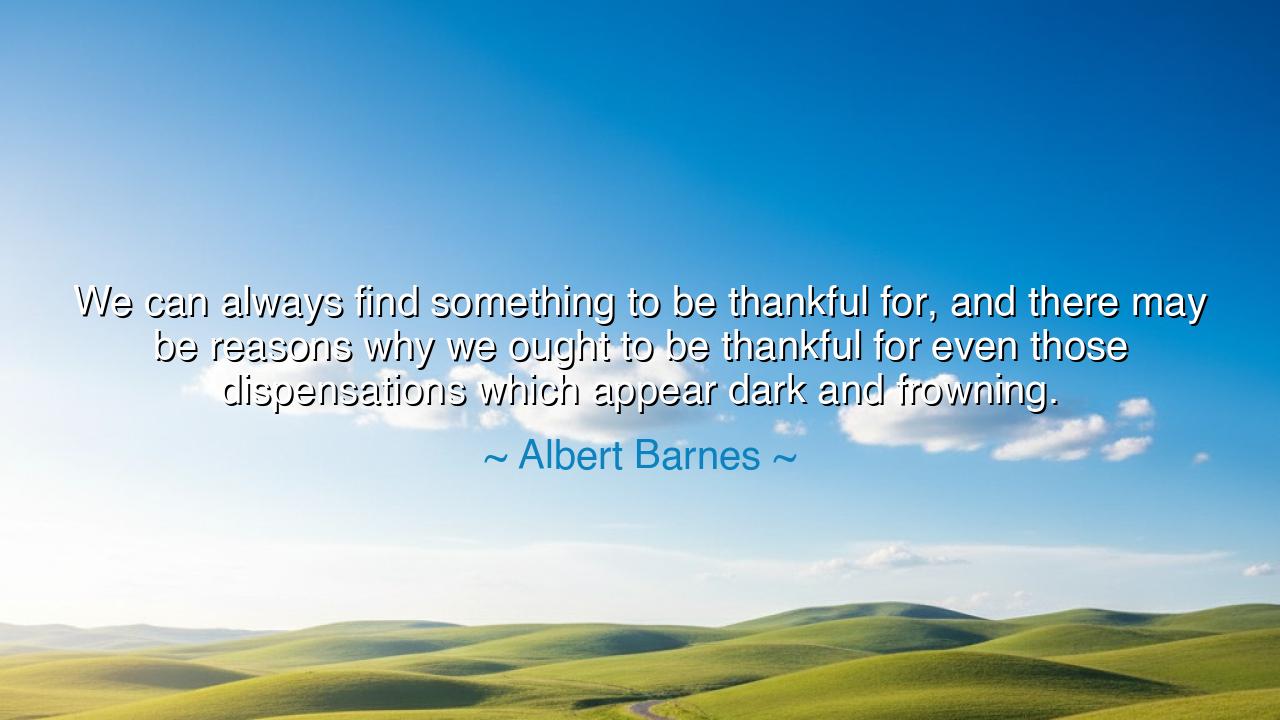
We can always find something to be thankful for, and there may
We can always find something to be thankful for, and there may be reasons why we ought to be thankful for even those dispensations which appear dark and frowning.






Hear the words of Albert Barnes, the wise commentator of Scripture, who declared: “We can always find something to be thankful for, and there may be reasons why we ought to be thankful for even those dispensations which appear dark and frowning.” In this utterance is a truth as ancient as Job, as enduring as the psalms: that gratitude is not bound to sunshine alone, but also to storm. The human soul is called not merely to rejoice when life is gentle, but to give thanks even in the shadow, where sorrow teaches lessons unseen by the eye of ease.
The first flame in his words is the certainty that we can always find something to be thankful for. No life is so poor that it is stripped of all blessing. Even in hunger, there may be breath. Even in loss, there may be memory. Even in despair, there may yet be hope unbroken. The ancients taught that thankfulness is not the absence of suffering but the recognition of mercy within it. Gratitude does not wait for abundance; it blooms wherever the soul dares to see beyond its pain.
The second truth is the paradoxical call to be thankful even for dark and frowning dispensations. These are the moments when fate seems cruel, when heaven appears silent, when doors are shut and hearts are broken. To give thanks here seems unnatural, yet Barnes reminds us that even such trials may be instruments of hidden good. For darkness deepens our vision, trials strengthen our endurance, and grief softens our hearts toward compassion. To despise these moments is to despise the very chisels by which the soul is carved into strength and beauty.
History bears witness to this wisdom. Consider the story of Viktor Frankl, the physician imprisoned in the concentration camps of Nazi Germany. Surrounded by cruelty and death, he found within suffering a new meaning. He wrote that even in the darkest dispensation, man retains the freedom to choose his response—to give thanks for the chance to endure with dignity, to hold on to love, to find purpose in pain. His testimony proves Barnes’s teaching: that even in frowning circumstances, gratitude can be found, and it can sustain the soul when all else is lost.
The third jewel in Barnes’s words is the recognition that reasons exist, though hidden, for every trial. Often we cannot see them in the moment; the storm blinds us, the wound consumes us. Yet with time, many come to understand that the trial was a teacher, the sorrow a purifier, the delay a protection. What appears as ruin may later be seen as foundation. What seems like abandonment may later be known as preparation. Gratitude, even in the dark, opens the heart to this larger vision.
The lesson for us is profound: if you would walk the path of wisdom, give thanks always. In joy, rejoice. In sorrow, search for the hidden mercy. Do not curse the shadows, for within them lie the seeds of endurance, humility, and compassion. Train your heart to bless not only the gifts you desired but also the burdens you resisted, for these too may be part of your shaping.
Practically, begin each day by naming not only what is pleasant, but also one hardship, and speak words of thanksgiving for what it may yet produce. When trials come, ask: What is this teaching me? What strength or mercy might lie hidden here? In doing so, you will no longer be crushed by adversity but transformed by it. Gratitude becomes not a mere reaction but a weapon, a shield, and a light in the valley of shadows.
Thus Albert Barnes’s words echo as eternal teaching: be thankful in all things, for even the dark and frowning dispensations carry hidden reasons for gratitude. In this wisdom lies strength unshakable, joy unbreakable, and peace that endures beyond the reach of sorrow.






AAdministratorAdministrator
Welcome, honored guests. Please leave a comment, we will respond soon